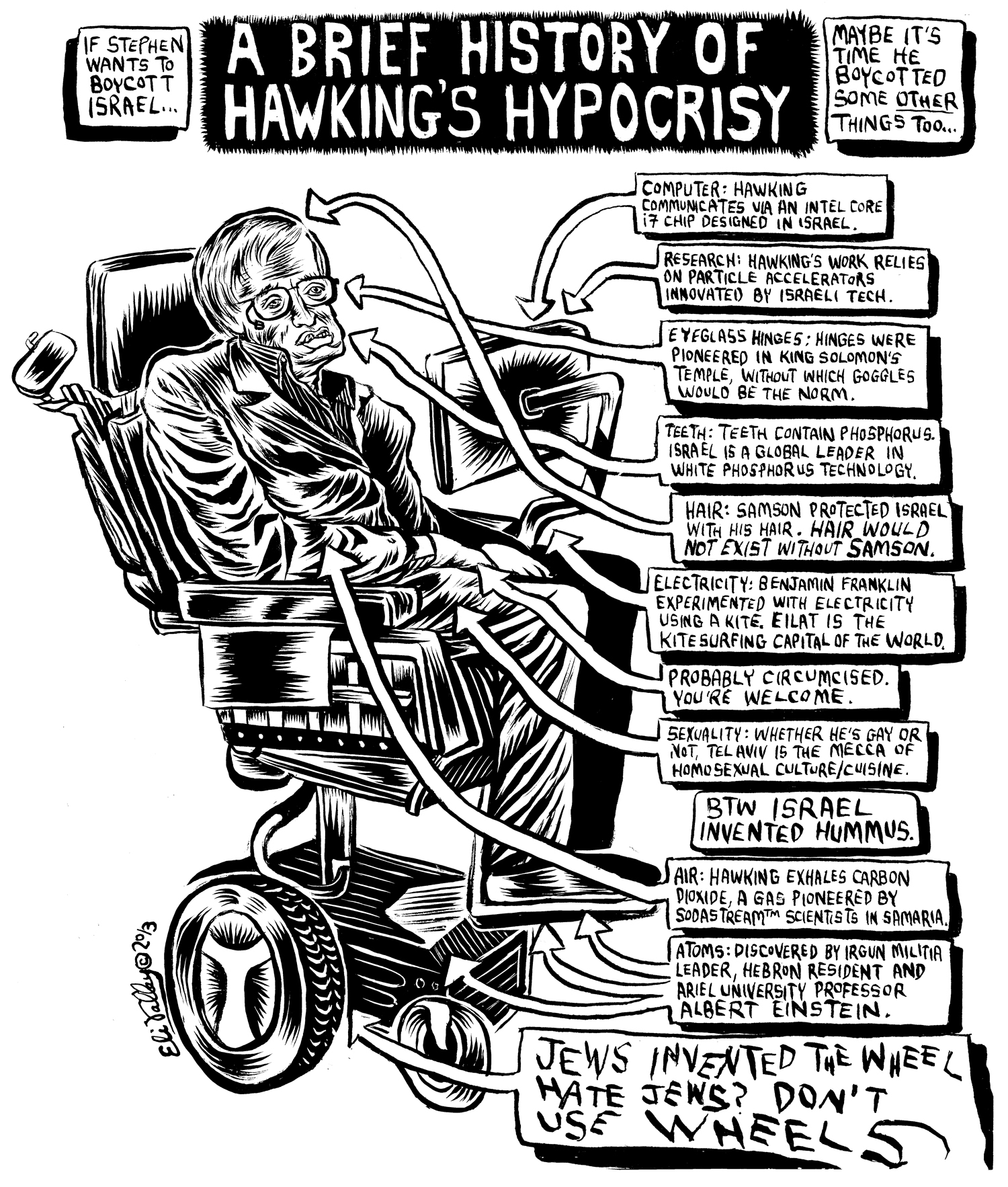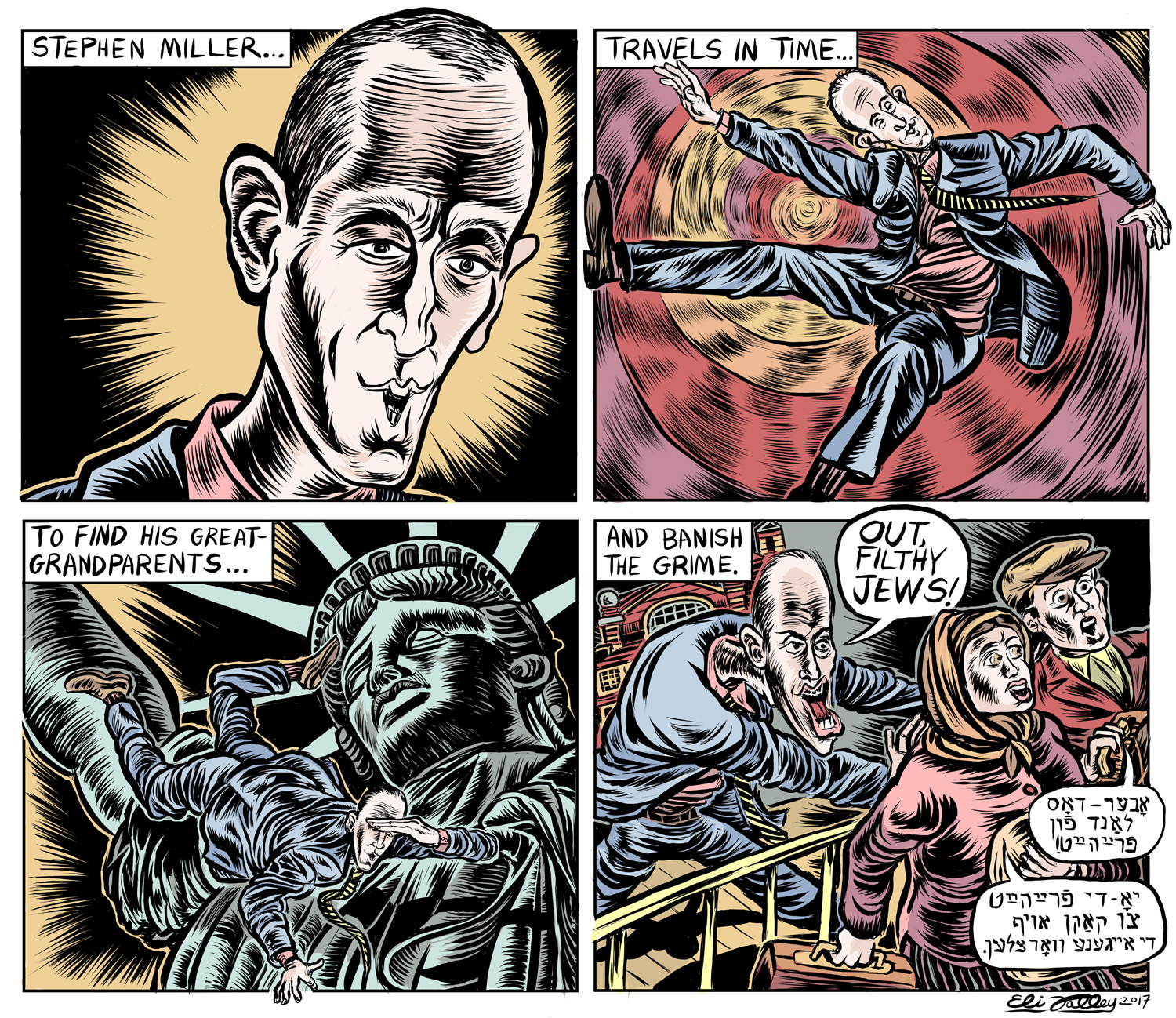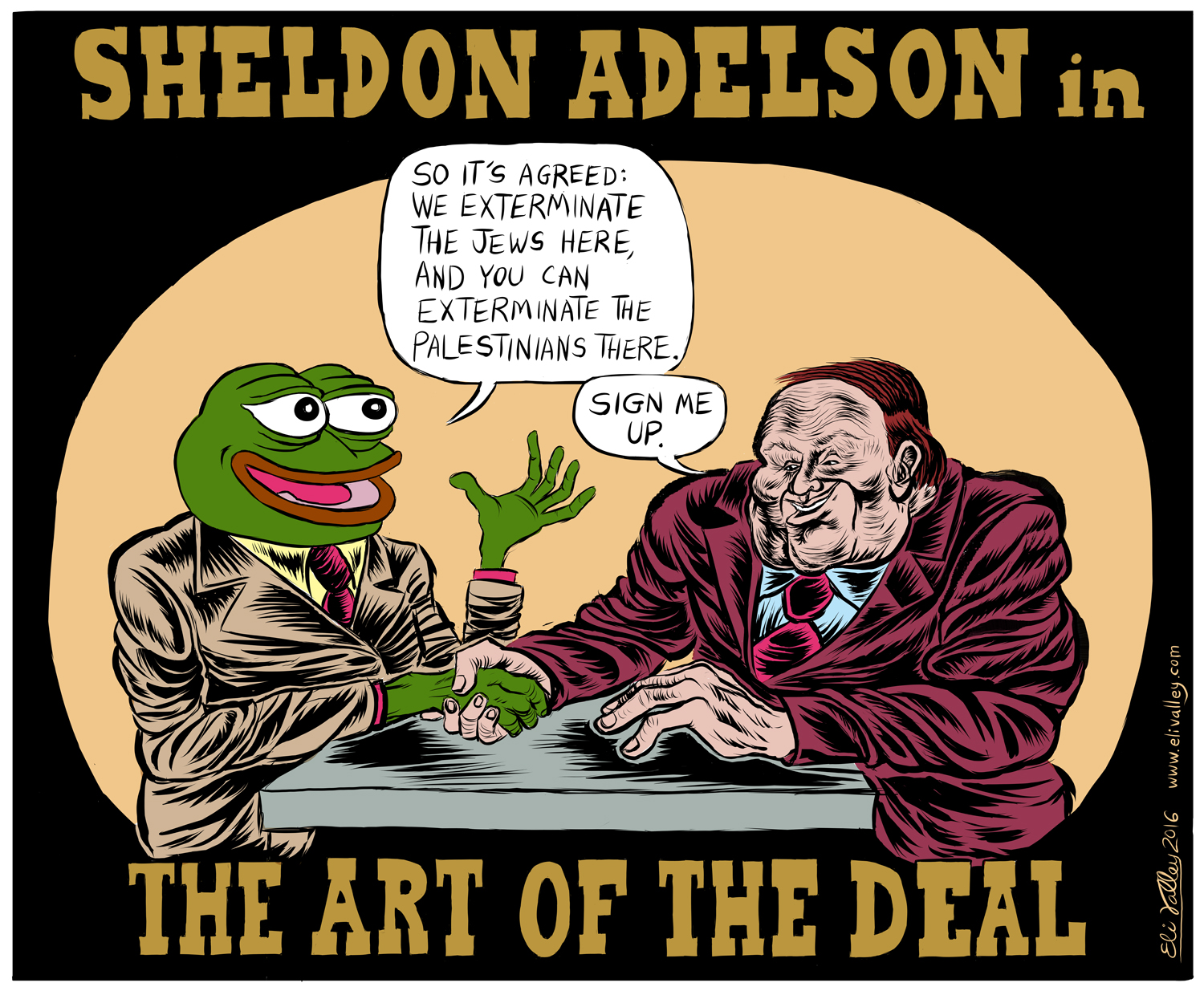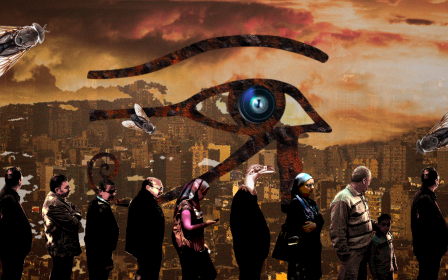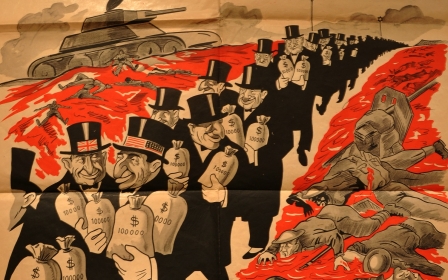Postcards from dystopia: The Jewish-American cartoonist hitting back at Zionism

I recognise Eli Valley as he walks into a cafe in the East Village. He is tall, sports rectangular specs and seems a little dishevelled, like all good artists should. He apologises for being tardy. “I am sorry. I haven’t slept much. I was up all night working on a new comic about Trump.”
“Hope you don’t mind if I grab a bite while we chat?” he says as he removes his jacket.
I don’t mind. I’ve just arrived myself. I am also giddy at the prospect of checking out a new comic featuring Trump. Since I began following this notorious Jewish-American cartoonist’s work, every new iteration of Trump seems only more vicious than the last.
His latest doesn’t disappoint.
Trump, resembling something between a fattened gargoyle and a fermented lamprey, hovers over a group of sycophants, serenading him with anti-Semitic hate while donning Trump-branded kippahs. The analogy is brutal.
New MEE newsletter: Jerusalem Dispatch
Sign up to get the latest insights and analysis on Israel-Palestine, alongside Turkey Unpacked and other MEE newsletters
Only an Eli Valley comic could have ably illustrated this implausible alliance between Trump, his right-wing Christian cohorts in the Republican Party and right-wing American Jews with the right amount of psychotic bile, I think to myself.
“This is insane,” I tell Valley. “And what is Trump supposed to be?”
“I will tell you in a bit,” he says nonchalantly as he turns to look at the waitron to order an omelette.
The rise of Diaspora Boy
As a kid, Valley had always been a fan of comics. Growing up between New York and New Jersey, he spent hours doodling, drawing superheroes and other bits and bobs, the 49-year-old now calls “silly”.
Later, at Cornell University, he drew comics for the campus newspaper. It was only around 2008 that he took it up seriously, and became what we regular folks would call a “political cartoonist”.
Though maintaining a day job as an editor for a magazine called Contact, he began publishing in The Forward, +972 Magazine, Jewish Currents and The Nib. It wasn’t long before his textured, often lewd and hysterical chiaroscuro had him marked as a leading shit-stirrer in the Jewish-American community.
And for good reason. Much of his work has explored the disconnect between Israeli Jews and the American Jewish community. He challenges the spurious attempts of 20th century Zionism to paint progressive, pluralistic diaspora Jews as either weak, diluting the community, or thwarting global Jewish security.
The notion of the “feeble diaspora” is a refrain used by Zionists to persuade Jews from around the globe to make aliyah (to move to Israel).
Valley satirised this Zionist myth by creating memorable characters like Israeli Man (whose “Greco-Roman features” and “seed [is] used to make the desert bloom”) and Diaspora Boy (who is “physically, psychologically and spiritually blind” and “a harbinger of death”).
Then he created Stuart the Jewish Turtle, whose dry and sad existence represents an older generation of Jewish America, obsessed with anti-Semitism and at odds with the generational shift in diasporic Jewish identity.
“He is literally living in a shell,” Valley says, ever-so-matter-of-factly.
But beyond upending Zionist humiliation for the diaspora Jew, Valley has spent much of his artistic rigour satirising Israel’s occupation of Palestine and the indifference of mainstream Jewish-Americans institutions to the crimes committed in their name. Jews are no longer on the margins of American society, Valley seems to say: they are a community with power and influence and the ability to delineate right from wrong.
Take, for instance, the 2014 Israeli invasion of Gaza, during which more than 2,200 Palestinians were killed.
At the time, Valley released a series of comics in which he parodied Israeli justification for the disproportionate bombing campaign and Benjamin Netanyahu’s resolve to blame Hamas for their actions.
In one, Netanyahu is told that donkeys were also killed during the bombardment. “When will Hamas stop hiding behind donkey shields?” the Israeli PM replies.
In another reference to the vicious attacks on Gaza and touted indifference of Israeli and American Jews, Valley invents “emergency vision wear for Jews in Israel and abroad” that distorts the images from Gaza, replacing the mayhem with images that reflect historical Jewish trauma instead.
Those who put on the goggles can choose to watch a documentary on the Inquisition or the Roman destruction of Jerusalem or even the Holocaust.
It is the type of biting satire that characterises his book, the grotesque style is but a facade for a pioneering project of social justice.
"What sets Valley apart is his ability to make the right people furious," Matt Lubchansky, a New York-based political cartoonist, tells me over the phone.
“The right-wing Jews of the world really are uncomfortable with their words being presented back to them so plainly,” say Lubchansky, who is also an associate editor at The Nib, an online daily comics publication.
“People like the Alan Dershowitzs, the Netanyahus, the AIPACS of the world. These are people and organisations that have completely lost touch with the modern Jewish identity. They think the Diaspora has failed or they see Israel as having a moral right to keep millions of people in open-air prisons.”
Diaspora Boy is a meditation in self-correction. Valley’s anguish is palpable and piercing
And Valley's 2017 anthology - aptly named Disapora Boy: Comics On Crisis In America and Israel - is precisely that: a deep dive into the Jewish-American subconscious. The book is a collection of some of his best (and most brutal) work since around 2008.
I read and re-read his comics like a man possessed. To me Diaspora Boy is a meditation in self-correction. Valley’s anguish is palpable and piercing.
He says that a lot of his work draws on the self-depreciative tradition of Yiddish satire. He also says he was influenced by a shrill of other factors: a reverent and religious rabbi father, a rebellious secular mother and a deluge of MAD magazines. For an artist willing to burn it all down, he sure is very considerate about tradition.
His artworks scream, torment and cry. Each canvas carries a sickly stench of political claptrap. If Will Elder and Harvey Kurtzman took Yiddish satire mainstream, then Valley has taken the composite aesthetic of MAD and dared to shove it back at his own. It simmers.
“There is something very Jewish about his criticism,” Lubchansky says. “And I do appreciate the grotesque nature of it. We live in a grotesque time, after all.”
“His art feels very singular to me. Morally, Eli has a very clear idea of the world and which side Jews are meant to stand on,” Lubchansky adds.
Voice of a generation
Valley seems genuinely stirred when I tell him how some of his fans described his work to me.
Yonit Friedman, an organiser from IfNotNow, the youth initiative that calls for the end of US support for Israel’s occupation, tells me that Valley’s work has become the voice of a generation of young American Jews - angry and betrayed by their institutions. His work is a type of catharsis, she says.
“He speaks very clearly to the outrage and frustration that a lot of us feel in IfNotNow and other progressive Jewish communities. A lot of us see anti-semitism being expressed in the US so openly and violently and for a lot of us [young people] this is new.
He continues to be described by detractors as a self-hating Jew, which he vehemently rejects
“While this is happening, a lot of mainstream Jewish institutions are choosing to side with the Israeli government and look the other way when members of Trump’s administration align with neo-Nazis. There is a lot of rage and Eli’s works speaks to that.”
Valley has been particularly busy since the November 2016 election of Trump as US president, doubling down on the absurdity of the times. He says he just keeps on moving from crisis to crisis, alluding to a string of outrageous stories to hit the American news cycle over the past few months.
Be it the racist attacks on Minneapolis Congresswoman Ilhan Omar (see main image), the burgeoning ties between white supremacists and Zionists, or the spate of attacks by white supremacists on synagogues in the US, Valley’s illustrations have been growing more acerbic by the day.
“From what I have seen, [Valley’s work] has definitely become more visceral in nature. The longer you draw, the more you double down. Maybe he is finding his voice or the world is just getting worse,” Lubchansky says. “It is getting hard to satirise the world. Reality is outpacing our ability to make fun of it.”
Others, like Michael Omer-Man, editor-in-chief of +972, the progressive Israeli magazine, describe Valley as having “always had an abrasive style that sort-of puts people on edge before they actually read the content.”
He too describes Valley as doubling-down on the sheer idiocy and danger of this historical moment.
“I think he has decided not to hold back at all with regards to the institutional support for Israel and the Republican establishment under Trump and his willingness to use Nazi analogies,” Omer-Man says.
“It is a lot starker and the stakes are higher both for the Jewish community in the United States and just for the United States in general and the world.”
Valley might be the rage on social media, but his abrasiveness has come at a price. In 2013, the Forward stopped taking his work after receiving a series of complaints about his work.
In the summer of 2018, the magazine though which he earned his daily bread, also shut down. For a bludgeoning perspective as his, there isn't that much scope or space in the mainstream media.
He also continues to be described by detractors as a self-hating Jew which he vehemently rejects. For Valley, his work speaks to a strain in the diaspora community that holds Jewish traditions of social justice close to its chest.
Most recently, when he made a mockery of Meghan McCain’s TV meltdown about Ilhan Omar’s comments on how lobby money has bought continued support for Israel in US politics, McCain, who is not Jewish, described his drawing of her as “one of the most anti-semitic things I’ve ever seen.”
'I am not drawing to change people’s minds. It’s not even on my radar'
- Eli Valley
I ask Valley, between the coffee and the omelette, if he loses potential readers by the sheer gratuity of his story-telling.
Surely the insinuation that Netanyahu raped former US President Barack Obama in space (as he drew in 2012, thereby earning him the wrath of Israeli and right-wing American media) or the persistent depiction of Trump as a self-cannibalising parasite are caricatures too far? Surely his affinity for embellishment distracts from the attempt to showcase bigotry and duplicity?
On this question, Valley is unequivocally clear.
“I am not drawing to change people’s minds. It’s not even on my radar,” he says. “I am not drawing for the right wing. I consider them to be lost. We are are going to be talking about Trump’s supporters in the future in the way we talk about atrocities of the 20th century.”
Likewise, Lubchansky challenges me to look at it from a different perspective.
“When was the last time you've seen someone change their mind about anything based on anything?"
We both laugh.
“When did you see an op-ed change someone’s mind? But we can accept that an op-ed can exist.”
“One cartoon won’t change anyone’s mind. But it might be one pebble. People have to change their mind ultimately. I don’t have any illusions of cartoons being important in that way.”
Reality bites
Back in the cafe, we finally get back to talk about that illustration.
“When I draw Trump like that, for me, it is a reflection of his soul,” Valley says as-a-matter-of-fact, "whereas my satire was probably more humorous and twisted stuff into a surreal realm, like a distorted mirror.
"Now I am just presenting reality. I call it postcards from dystopia.”
Disapora Boy: Comics On Crisis In America And Israel is published by OR Books
Middle East Eye delivers independent and unrivalled coverage and analysis of the Middle East, North Africa and beyond. To learn more about republishing this content and the associated fees, please fill out this form. More about MEE can be found here.





